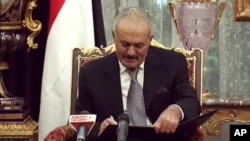Yemen's President Ali Abdullah Saleh sat down with opposition leaders in the Saudi capital Riyadh Wednesday to sign a long awaited agreement to transfer power to his vice president, hold early elections and put an end to months of bloodshed.
Onlookers clapped as President Saleh and Yemeni opposition leaders signed the deal to transfer power, a deal that had long eluded them. The accord was a major victory for the Gulf Cooperation Council (GCC), which had worked patiently to broker it, and for Saudi Arabia's King Abdullah who invested his prestige to bring it about.
|
A Look At Yemen's Power Transfer Agreement: Yemen's President Ali Abdullah Saleh has signed an agreement designed to end months of anti-government unrest. Here is a look at the main provisions in the plan crafted by the Gulf Cooperation Council:
|
King Abdullah told the Yemeni politicians that a new page in their history has been turned, and he urged them to work to bring peace to their strife-torn country.
President Saleh had promised to sign the Gulf plan three different times in recent months, but reneged each time. The deal will allow Mr. Saleh to remain president in name until elections are held in three month's time, bringing an end to his 33 year rule.
Gulf Cooperation Council Secretary-General Abdel Latif Zayani spent many hours in Yemen during the past six months to broker the deal. He called the signing "historic."
He said it is a decisive moment in which the Yemeni parties are meeting in Saudi Arabia to achieve reconciliation and understanding. He thanks King Abdullah for his sponsorship of the talks and says he is thankful the GCC mediation resulted in an agreement that will bring an end to bloodshed in Yemen.
President Saleh said he regrets the bloodshed that resulted during the 10-month old popular uprising to overthrow him. He claimed the turmoil was the result of outside forces that have been pushing their own agenda in the Arab world.
Despite the optimism surrounding Wednesday's ceremony, Yemen scholar Gregory Johnsen at Princeton University says that it's far from clear that the signing will put a decisive end to the months of violence in the country. "I think that Saleh just ran out of options and was forced to sign this, but I don't think it represents the end of the process in Yemen. President Saleh's eldest son Ahmad Ali is still in Sana'a, with a number of forces loyal to him, as are a number of his nephews. The army is still split, and the deal that the opposition made with President Saleh is not one that a majority of the protesters in the street support," he said.
U.N. Secretary-General Ban Ki-moon said Wednesday that President Saleh plans to fly to New York to continue medical treatment for burns and other injuries suffered during a bomb attack at the presidential compound in June.
Timeline of anti-government unrest in Yemen
| Join the conversation on our social journalism site - Middle East Voices. Follow our Middle East reports on Twitter and discuss them on our Facebook page. |




